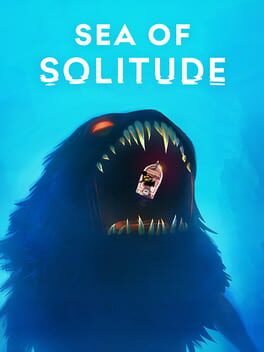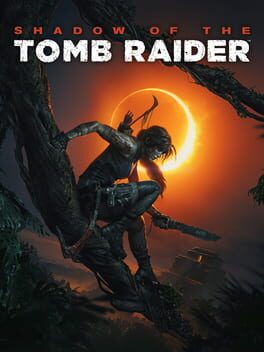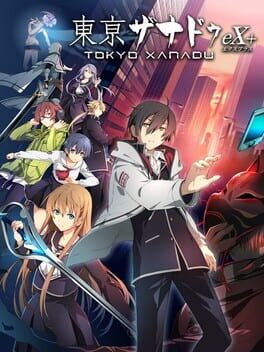Fenrik
2019
Overall, this was a decent open-world (more like open-county) racing game but only a slight improvement over Rivals which is the only other entry I've played so far. Speaking of Rivals, I found the Night/Day mechanic of earning cash and reputation to be much more succinct than the Racer/Cop back and forth which essentially made you play the game twice. There is a staggering amount of customisation for both your vehicle of choice and your avatar, however, it's a shame the latter ends up being squandered on a story that barely seemed to acknowledge them for the most part; had no regrets slapping a LED mask onto them given how minute their emotional stakes are (and somewhat pretended they were a distant cousin of Wrench from Watch Dogs 2). Everything else is fairly standard fare: an okay selection of event types, overly familiar collectibles (except for the destructible flamingos...yeah, really) and competent controls depending on what terrain/event you specialise your car for. Enjoyed my 20 hours or so with it but I'm in no rush to play it again.
2019
Sea of Solitude tackles a topic that I've had personal experience with for quite a while; check the title if you really need cluing in. Sadly, its impact as a form of entertainment is as positive as it is negative. You'll be on the edge of your seat navigating Kay through tense situations as well as groaning since she moves like a ton of bricks. Your ears will be graced by its music and sound design and then they'll get tortured with voice acting that's okay at best; ear-grating at worst. And, finally, just when you think you're witnessing a masterpiece, everything starts to buckle under technical glitches and a conclusion that's disappointingly simple for what this project attempts to cover. It's a beautiful piece of art that fails to hide the smudges that plague the entire canvas.
If you liked the previous games in this trilogy, you'll get the same enjoyment out of this one. That is both my greatest compliment and my largest gripe. Shadow was touted as "Lara's definitive moment" and the finale of this reboot; yet so much of it, both gameplay and narrative, resembles a middle-point adventure like Rise did. Sure, I loved the additions to platforming and how the combat was downplayed this time around so the encounters felt more special, however, nothing besides the change to the setting and culture (which are portrayed with staggering amounts of authenticity) convinced me I wasn't playing the same good game for the third time in a row. All three of these entries are solid AAA experiences but I'm glad the folks at Square Enix will be moving on with this franchise; hopefully for the better.
2016
This review contains spoilers
"Don't call it Trails of Persona. Don't call it Trails of Persona." - Moi
You know what, it sucks being a Brit who enjoys Japanese video games. If a game isn't stranded in translation limbo, then it's having its physical releases denied for the PAL region. Between instances like the Megami Tensei series mostly being available only through digital means or critical darlings like Xenoblade Chronicles & Fire Emblem: Path of Radiance costing you an arm and a leg to own physical copies, it is honestly a miracle I manage to find obscure Eastern releases for a manageable price. Imagine my pleasant surprise when I spy Falcom's Tokyo Xanadu eX+ for ten pounds sterling, a far cry from the swanky price for the collector's edition which was the last time I noticed it being sold; after recently dipping my toes into the Trails series with its debut entry, I was up for experimenting with one of Falcom's more modern works.
Xanadu's story takes place in an alternate reality of modern Tokyo where natural disasters are, in truth, spawned from a supernatural dimension called the Eclipse. When high-schooler Kou, our protagonist, happens upon Asuna from Sword Art Onli- oh I mean his classmate, Asuka, entering one of the gates to said Eclipse, he inadvertently gets pulled in alongside her and is attacked by Greeds which are spawned from negative emotions. After Asuka saves him using her Soul Device, a weapon capable of defeating Greeds, Kou volunteers to help her eliminate the rampant rifts suddenly appearing around their hometown and eventually solve the mystery of what the Eclipse really is.
As you can see, it's the typical "teenagers fight against supernatural forces" narrative commonly found in the genre, heck in fiction in general, and its first few chapters are easily its weakest. A good amount of the first half is dedicated to introducing the main cast like each chapter was its own episode of a serialised anime. There is a notable improvement in its latter half where there is a larger emphasis on mystery and world-building.
Unlike most Falcom games that made it overseas, this wasn't localised by XSeed or NIS America but rather Aksys Games. Let's just say the translation here is...interesting? Tutorials and most of the dialogue are perfectly fine but there were occasional quirks sprinkled throughout my 60-hour playtime that, without fail, incited some eyebrow-lifting. Understandably, Tokyo Xanadu takes place in 2015 so a random usage of internet lingo wouldn't be too much of a stretch and I'd be lying if there wasn't any charming writing to be found here. But..."Fukkleducks"? Really? It's not Ys 8 levels of awful but it certainly detracts from the immersion when the story is eventually on full throttle.
Gameplay is best summed up in two halves: One is the downtime of modern Persona games with a ton more leniency in terms of how much you can participate; the other a dungeon-crawler with real-time action reminiscent of a Ys title with an added score attack element. So, I’ll do just that to describe them.
Firstly, free time is granted towards the start of each chapter: you are free to talk with the locals, play minigames, attempt optional dungeons and develop party members and other important classmates through character episodes. If you’re inclined to experience as much as possible, it’s recommended to speak to NPCs every chapter in order to activate secret quests and earn extra perks; this alone drags out the lapse between story and combat. Side quests are luckily interesting, both for the characters and gameplay, and provide enjoyable scenarios with a few duds requiring revisits of previous dungeons.
Secondly, plunging into the Eclipse is arguably more engaging. Slaying Greeds with a mixture of charged attacks and special moves managed to stay satisfying throughout the whole game, despite it lacking in the challenge department, doubly so with Falcom's trademark guitars rocking out during boss fights. Seriously, if you have any experience with an Action RPG before Xanadu (which if you don’t then I don’t believe you), at least choose 'Hard' as enemies are a notable threat if you aren’t careful with evading. Party members share the same move set but have altering properties and elements that differentiate their playstyles so none of them felt unbalanced.
Technically speaking, I should be calling Tokyo Xanadu a slightly above-average JRPG elevated by a solid soundtrack and an unorthodox setting...but I'm not. Feel free to call me crazy after considering its strengths and weaknesses but I believe it manages to be greater than the sum of its parts. Interacting with the residents of Morimiya and experiencing their own side stories, whilst time-consuming, grew more authentic with each story chapter to the point where I felt sentimental when it was finally time to say goodbye. If you're interested in what Falcom has to offer, I'd say Xanadu is a decent middle-ground between Ys and Trails, I wouldn't recommend making it the first game you play from their catalogue however.
Now if you'll excuse me, I'm going to listen to "Seize the Day" for the 87th time. Hope you love this song as much as the game does.
You know what, it sucks being a Brit who enjoys Japanese video games. If a game isn't stranded in translation limbo, then it's having its physical releases denied for the PAL region. Between instances like the Megami Tensei series mostly being available only through digital means or critical darlings like Xenoblade Chronicles & Fire Emblem: Path of Radiance costing you an arm and a leg to own physical copies, it is honestly a miracle I manage to find obscure Eastern releases for a manageable price. Imagine my pleasant surprise when I spy Falcom's Tokyo Xanadu eX+ for ten pounds sterling, a far cry from the swanky price for the collector's edition which was the last time I noticed it being sold; after recently dipping my toes into the Trails series with its debut entry, I was up for experimenting with one of Falcom's more modern works.
Xanadu's story takes place in an alternate reality of modern Tokyo where natural disasters are, in truth, spawned from a supernatural dimension called the Eclipse. When high-schooler Kou, our protagonist, happens upon Asuna from Sword Art Onli- oh I mean his classmate, Asuka, entering one of the gates to said Eclipse, he inadvertently gets pulled in alongside her and is attacked by Greeds which are spawned from negative emotions. After Asuka saves him using her Soul Device, a weapon capable of defeating Greeds, Kou volunteers to help her eliminate the rampant rifts suddenly appearing around their hometown and eventually solve the mystery of what the Eclipse really is.
As you can see, it's the typical "teenagers fight against supernatural forces" narrative commonly found in the genre, heck in fiction in general, and its first few chapters are easily its weakest. A good amount of the first half is dedicated to introducing the main cast like each chapter was its own episode of a serialised anime. There is a notable improvement in its latter half where there is a larger emphasis on mystery and world-building.
Unlike most Falcom games that made it overseas, this wasn't localised by XSeed or NIS America but rather Aksys Games. Let's just say the translation here is...interesting? Tutorials and most of the dialogue are perfectly fine but there were occasional quirks sprinkled throughout my 60-hour playtime that, without fail, incited some eyebrow-lifting. Understandably, Tokyo Xanadu takes place in 2015 so a random usage of internet lingo wouldn't be too much of a stretch and I'd be lying if there wasn't any charming writing to be found here. But..."Fukkleducks"? Really? It's not Ys 8 levels of awful but it certainly detracts from the immersion when the story is eventually on full throttle.
Gameplay is best summed up in two halves: One is the downtime of modern Persona games with a ton more leniency in terms of how much you can participate; the other a dungeon-crawler with real-time action reminiscent of a Ys title with an added score attack element. So, I’ll do just that to describe them.
Firstly, free time is granted towards the start of each chapter: you are free to talk with the locals, play minigames, attempt optional dungeons and develop party members and other important classmates through character episodes. If you’re inclined to experience as much as possible, it’s recommended to speak to NPCs every chapter in order to activate secret quests and earn extra perks; this alone drags out the lapse between story and combat. Side quests are luckily interesting, both for the characters and gameplay, and provide enjoyable scenarios with a few duds requiring revisits of previous dungeons.
Secondly, plunging into the Eclipse is arguably more engaging. Slaying Greeds with a mixture of charged attacks and special moves managed to stay satisfying throughout the whole game, despite it lacking in the challenge department, doubly so with Falcom's trademark guitars rocking out during boss fights. Seriously, if you have any experience with an Action RPG before Xanadu (which if you don’t then I don’t believe you), at least choose 'Hard' as enemies are a notable threat if you aren’t careful with evading. Party members share the same move set but have altering properties and elements that differentiate their playstyles so none of them felt unbalanced.
Technically speaking, I should be calling Tokyo Xanadu a slightly above-average JRPG elevated by a solid soundtrack and an unorthodox setting...but I'm not. Feel free to call me crazy after considering its strengths and weaknesses but I believe it manages to be greater than the sum of its parts. Interacting with the residents of Morimiya and experiencing their own side stories, whilst time-consuming, grew more authentic with each story chapter to the point where I felt sentimental when it was finally time to say goodbye. If you're interested in what Falcom has to offer, I'd say Xanadu is a decent middle-ground between Ys and Trails, I wouldn't recommend making it the first game you play from their catalogue however.
Now if you'll excuse me, I'm going to listen to "Seize the Day" for the 87th time. Hope you love this song as much as the game does.
This review contains spoilers
Metroidvania (or Castletroid if you prefer) is among my favourite genres with Guacamelee & Hollow Knight being a couple of examples I fell in love with this past generation. Finally covering the game that popularised this design philosophy has been fascinating and I understand how so many developers still cite this entry as a inspiration. Though Toru Hagihara held both the Director and Producer roles for this project, it would be his colleague in programming, Koji Igarashi, that went on to produce several future entries which expanded upon Symphony's experimental gameplay style.
You play as Alucard, the son of Dracula, who has to traverse his father's not-so-humble abode to put an end to a reawakened evil; along the way, he meets Maria who is also exploring the castle to find Richter Belmont who disappeared after defeating Dracula four years prior in Castlevania: Rondo of Blood. To contend with a fiendish array of monsters, Alucard has access to various weapon types, armour, spells and familiars which are found through non-linear exploration on a 2D map. Additionally, he can be upgraded by amassing experiencing points from defeating enemies and increasing stats such as strength and intellect which are commonplace in RPGs. Certain items and skills will need to be obtained and learnt to bypass previously impossible obstacles and unlock more areas of Dracula's castle.
For a first attempt at splicing Metroid's exploration and RPG mechanics, Symphony of the Night does so much right and still holds up even after a myriad of games adding their own flavours to its structure. Exploring the multitude of Gothic locales was a joy due to how ingeniously designed the entire castle is and is accentuated with satisfying combat that supports various playstyles which was quite the departure from earlier titles' linear move sets. Bolstering the rewarding exploration are wonderfully detailed environments and sprite work that, despite being drenched in darker tones, emanate atmosphere and is a treat to look at. Great animations are not exclusive to Alucard and extend to an immense variety of enemy types that range from darkly charming to nightmare-inducing.
Despite being the longest instalment at the time of release, there are only a few cutscenes laced throughout my 9-hour playtime and the narrative is placed on a backburner in its latter half. Thankfully, whatever story is here is delivered with solid voicework which was a pleasant surprise given how infamous the intro was in the original PS1 version. In fact, the audio in general is particularly strong thanks to Michiru Yamane's compositions adding to the aforementioned boatloads of atmosphere, every area sounds distinct from each other with those closer to Dracula's throne possessing a regal yet intimidating tone whilst deeper sections emphasise dread-soaking strings; one constant being that it has the necessary energy to co-exist with the engaging combat.
Coincidentally, both of my largest gripes apply to the pause screen: firstly, it is one of the ugliest ones I've encountered in terms of layout with information being in random locations to an amateurish degree; secondly, the inventory lacks proper sorting options and has to be manually organised. This isn't too egregious for armours and accessories since there aren't an overwhelming amount to choose from, however, prepare to handle the mess that is whatever goes in Alucard's hands (usable with Square and Circle) as you'll have to comb through an endless slew of swords, greatswords, maces, rods, fists, shields, restorative items, throwable items, stat potions, elemental potions, summons aaaaaand peanuts. Yes, that last one was worth noting. It really mitigates the fun factor of boss fights when they're interrupted by Menu Mania in order to recover health or implement any strategies.
Despite its few flaws, it is a testament to how enjoyable Symphony is that I felt iffy whenever I put it down, so I loaded my save a few minutes later anyway to continue the plunge. That is the best kind of addicting. Even when a horror novice like myself encountered areas like the Catacombs and monstrosities like Beelzebub and Legion, which frankly freaked me out, I was spurred on to conquer my fears as a by-product of continuing Alucard's mission. Prior to this playthrough, Castlevania was one of those series I had been aware of for a while but never felt the urge to try it since Gothic horror did not do anything for me on an aesthetical level. If any other entry is even nearly as good as Symphony, then colour me interested. The night is still young indeed.
You play as Alucard, the son of Dracula, who has to traverse his father's not-so-humble abode to put an end to a reawakened evil; along the way, he meets Maria who is also exploring the castle to find Richter Belmont who disappeared after defeating Dracula four years prior in Castlevania: Rondo of Blood. To contend with a fiendish array of monsters, Alucard has access to various weapon types, armour, spells and familiars which are found through non-linear exploration on a 2D map. Additionally, he can be upgraded by amassing experiencing points from defeating enemies and increasing stats such as strength and intellect which are commonplace in RPGs. Certain items and skills will need to be obtained and learnt to bypass previously impossible obstacles and unlock more areas of Dracula's castle.
For a first attempt at splicing Metroid's exploration and RPG mechanics, Symphony of the Night does so much right and still holds up even after a myriad of games adding their own flavours to its structure. Exploring the multitude of Gothic locales was a joy due to how ingeniously designed the entire castle is and is accentuated with satisfying combat that supports various playstyles which was quite the departure from earlier titles' linear move sets. Bolstering the rewarding exploration are wonderfully detailed environments and sprite work that, despite being drenched in darker tones, emanate atmosphere and is a treat to look at. Great animations are not exclusive to Alucard and extend to an immense variety of enemy types that range from darkly charming to nightmare-inducing.
Despite being the longest instalment at the time of release, there are only a few cutscenes laced throughout my 9-hour playtime and the narrative is placed on a backburner in its latter half. Thankfully, whatever story is here is delivered with solid voicework which was a pleasant surprise given how infamous the intro was in the original PS1 version. In fact, the audio in general is particularly strong thanks to Michiru Yamane's compositions adding to the aforementioned boatloads of atmosphere, every area sounds distinct from each other with those closer to Dracula's throne possessing a regal yet intimidating tone whilst deeper sections emphasise dread-soaking strings; one constant being that it has the necessary energy to co-exist with the engaging combat.
Coincidentally, both of my largest gripes apply to the pause screen: firstly, it is one of the ugliest ones I've encountered in terms of layout with information being in random locations to an amateurish degree; secondly, the inventory lacks proper sorting options and has to be manually organised. This isn't too egregious for armours and accessories since there aren't an overwhelming amount to choose from, however, prepare to handle the mess that is whatever goes in Alucard's hands (usable with Square and Circle) as you'll have to comb through an endless slew of swords, greatswords, maces, rods, fists, shields, restorative items, throwable items, stat potions, elemental potions, summons aaaaaand peanuts. Yes, that last one was worth noting. It really mitigates the fun factor of boss fights when they're interrupted by Menu Mania in order to recover health or implement any strategies.
Despite its few flaws, it is a testament to how enjoyable Symphony is that I felt iffy whenever I put it down, so I loaded my save a few minutes later anyway to continue the plunge. That is the best kind of addicting. Even when a horror novice like myself encountered areas like the Catacombs and monstrosities like Beelzebub and Legion, which frankly freaked me out, I was spurred on to conquer my fears as a by-product of continuing Alucard's mission. Prior to this playthrough, Castlevania was one of those series I had been aware of for a while but never felt the urge to try it since Gothic horror did not do anything for me on an aesthetical level. If any other entry is even nearly as good as Symphony, then colour me interested. The night is still young indeed.




